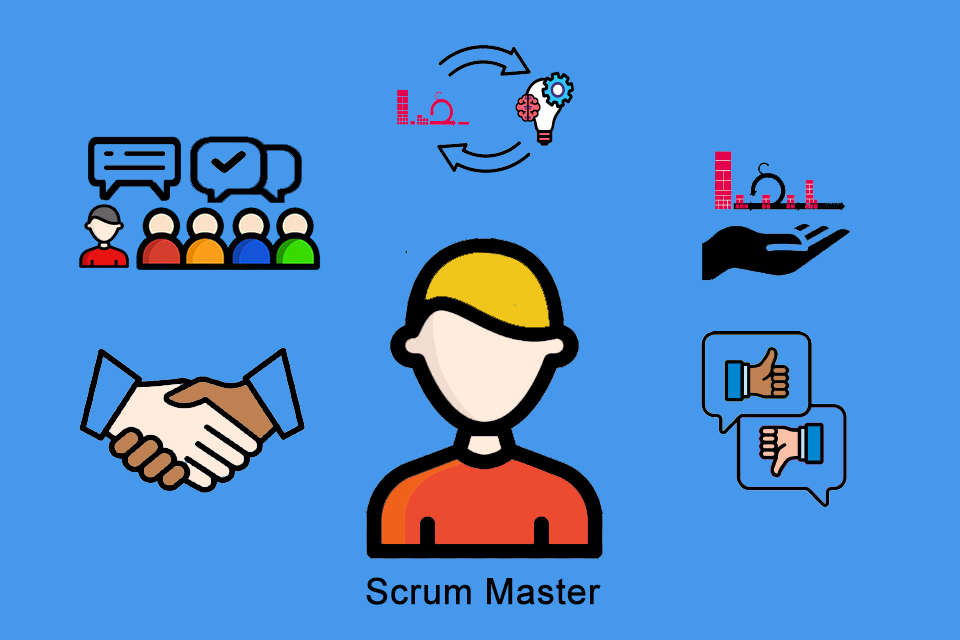What is a Scrum Master?
Table of Contents: Definition – Tasks – False attributions – Questions from the field – Download – Notes
Smartpedia: The Scrum Master is accountable for establishing Scrum. As part of the Scrum Team he supports the Product Owner, the developers and the organisation in achieving goals together.
Scrum Master – accountable for establishing Scrum
The Scrum Master is responsible for the implementation of Scrum – as defined in the Scrum Guide. Being a member of the Scrum Team, he is a so-called facilitator and acts as a moderator, mediator, process companion, supporter and coach. Put simply, he helps Developers and the Product Owner – the other two accountabilities that Scrum defines as a framework – to achieve goals together by facilitating the work of colleagues and promoting cooperation.
The activities of the Scrum Master are very demanding: It is his responsibility to create a trusting, open working atmosphere. He encourages interaction and communication with each other. He represents a mindset based on the principles of the Agile Manifesto. He lives and promotes the values of the framework. And he is a close observer and must, for example, address unproductive behaviour or offer appropriate feedback.
The tasks of the Scrum Master
What does a Scrum Master actually do? A common misunderstanding is that the Scrum Master “only” moderates the meetings or events. The current Scrum Guide 2020 emphasises that he acts in the direction of the Product Owner, the Developers and not to forget the organisation. With a positive attitude he is responsible for the following tasks in practice:
- He coaches the team members in self-management and in cross-functional, productive cooperation.
- He supports the Scrum team in the creation of high quality Increments and helps to meet the Definition of Done.
- He takes care of the impediments that were discussed, for example, during the stand-up meeting, if the developers cannot remove them on their own.
- He ensures that the rules are adhered to, organises the various events and is the guardian of the timebox.
- He supports the Product Owner in finding techniques for the effective definition of the Product Goal and Product Backlog Management.
- In a complex environment he helps the Product Owner to establish empirical product planning.
- It supports the Product Owner and the Developers in Sprint Planning and the selection of Backlog Items from the Product Backlog to be implemented in the next Sprint. Possibly he also moderates a Planning Poker or a Magic Estimation (even if they are not part of the framework).
- If necessary, he moderates the Daily Scrum, in which the Developers discuss completed and upcoming tasks on the way to the Sprint Goal. In some organisations he updates the taskboard.
- He moderates the Sprint Review and thus the presentation of the generated Increment.
- He leads the Retrospective, which may also include feedback for his own work and where he also actively shares his observations.
- If necessary, he supports the Scrum team in the exchange with stakeholders, so that they can develop a good understanding of the agile approach. In addition, he offers help with methodological questions, especially since he is by definition a Master of Scrum – i.e. he has mastered the framework.
Of course, he also works with other Scrum Masters to establish or consolidate the procedure in the company and to increase its effectiveness. If there is a Scrum of Scrums within the organisation, he takes care – often in a rolling order – of the event and the exchange between the participants. And sometimes he creates the organisational prerequisites for working with the framework or supervises a corresponding introduction, although this often falls within the remit of an Agile Coach.
False Attributions: What isn’t a Scrum Master?
There are always discussions about the role of the Scrum Master. Basically these discussions are very important within and for organisations, especially when companies start working agile, or when the role of the Scrum Master and also the cooperation in the team develops over time.
- He is not a superhero and he should not be.
- He is not a Feel Good Manager and he is not a hidden project manager.
- He has no authority to give instructions and therefore no power of decision.
- And he does not take on a double function as product owner or developer.
The Scrum Master is Facilitator and Servant Leader. And these are important activities. As a facilitator he works on the system within the system. He is not a hero, who always protects all participants, but he protects the team from outside influences. As Servant Leader he helps the participants, depending on the situation and against resistance if necessary. He offers help for self-help without creating dependencies. And he does this with courage, determination and courage. And these qualities are synonymous with “heroic”. [1]
Questions from the field
Here you will find some questions and answers from the field:
What is a good Scrum Master?
To know the principles of Scrum with its roles, events and artefacts is not enough to be a good Scrum Master. Ideally you don’t take on the role as a beginner either. Opinions differ as to the required IT skills and industry knowledge. If you believe many job advertisements, IT skills – e.g. in the form of completed degree programmes – are required. However, if you speak directly with Scrum Masters, often technical knowledge is not necessary. Knowledge of the industry and/or domain, on the other hand, is considered useful. And certificates are seen as an entry ticket or prerequisite for receiving job offers. As proof of expertise, however, they are almost completely useless (even if the certification industry naturally judges this differently).
It is clear that a Scrum Master should embody the values that the framework sets:
- Commitment to the team and the organisation to do their best.
- Courage to address and change things.
- Openness to create a basis for feedback, new ideas and trust.
- Focus on aspects that are important for improving cooperation and focus on content work in the various meetings.Respect for the people behind the roles and tasks, and for the perspectives and achievements of those involved.
In addition, various skills such as empathy, analysis, group moderation and communication strength are certainly beneficial. Probably all these in combination make a good Scrum Master, don’t you think?
How many teams can a Scrum Master manage in parallel?
In development practice there are always questions about the number of teams that a Scrum Master can manage at the same time. This discussion primarily reveals an erroneous understanding of the task, because even if he is responsible for adhering to the rules, he is not the manager of the team or teams. A facilitator does not decide; he encourages and supports.
The actual answers vary from one to a maximum of six teams. The number 6 results from a small calculation: one Scrum Master spends approximately 13 hours per 2-week sprint in team meetings. 13 hours x 6 teams / 8 working hours per day = 9.75 days that he would sit in team meetings during the 10 available working days. He had only 2 hours for necessary preparation and follow-up of meetings, for coaching, individual discussions or escalations. More teams do not work mathematically, much less – one or two teams – probably makes the most sense.
What Scrum Master certifications exist?
There are numerous organisations that offer different certificates for Scrum Masters. The two best known are probably the
- Certified Scrum Master (CSM), offered by the Scrum Alliance [2],
- and Professional Scrum Master (PSM), offered by Scrum.org [3].
The main difference between CSM and PSM lies in the type of certification: CSM is based on a combination of training – conducted by a Certified Scrum Trainer (CST) or a Certified Enterprise Coach (CEC) – and a test. The PSM separates training and certification, so a Professional Scrum Master has passed a test but does not need to have attended an official training. Furthermore, a PSM training does not have to be conducted by a certified trainer.
In addition to CSM and PSM, the two organisations mentioned above offer additional certifications. For the Scrum Alliance these are
- Advanced CSM (A-CSM),
- Certified Scrum Professional (CSP),
- Certified Team Coach (CTC),
- Certified Enterprise Coach (CEC) and
- Certified Scrum Trainer (CST).
And at Scrum.org these are in addition to the Professional Scrum Master I (PSM I),
- Professional Scrum Master II (PSM II),
- Professional Scrum Master III (PSM III), and
- PSM Trainer (PST).
Obviously the Scrum Alliance offers significantly more certificates than Scrum.org. In addition, the Scrum Alliance demands a recertification every 2 years. At Scrum.org this requirement does not exist.
In most cases, certification only takes a few days. It would be a misbelief to assume that the possession of a certificate alone is sufficient to master the framework or the tasks and activities of a Scrum Master. In reality it is similar to a driving licence. This entitles you to drive a vehicle, but the owner of the driving licence can only drive a car really well many years later and only if he regularly drives, drives and drives.
How much money does a Scrum Master earn in Germany?
A general answer to this question is difficult, as it can depend on various factors – professional experience, industry, employer, location, certificates, negotiating skills, supply and demand, etc. The following table can be found on Gehalt.de:
- More than 9 years of professional experience: 77,870 euros per year
- Between 7 – 9 years of professional experience: 62,965 euros per year
- Between 3 – 6 years of professional experience: 58,124 euros per year
- Less than 3 years of professional experience: 54,510 euros per year
According to Radviser or payscale, the salary for newcomers (with 1-4 years of experience) is typically around €54,000 to €60,000 per year, while more experienced Scrum Masters (5-9 years of experience) can expect salaries of around €70,000 per year. In higher positions, especially at larger companies, salaries can even reach €85,000 or more.
Can a Scrum Master be a Product Owner at the same time?
There are a number of reasons why a Scrum Master (SM) should not be a Product Owner (PO) at the same time:
The combination of responsibilities creates a conflict of interest. The Product Owner maximises the value of the product, which often requires prioritisation and difficult trade-offs. The Scrum Master ensures that practices are followed and promotes a healthy team environment. Combining these responsibilities jeopardises both priorities and reduces objectivity and effectiveness.
Both activities require full attention to be effective. The PO must communicate with stakeholders, monitor market trends and ‘live’ the product backlog, creating alignment with employees. At the same time, the SM needs to focus on mentoring the team, helping to remove obstacles and contributing to change at an organisational level. The combination of activities can dilute the focus and lead to sub-optimal performance in both areas.
Scrum is based on clear responsibilities. The PO is responsible for the product backlog and value delivery, while the SM is responsible for the process and team health. Merging the roles could prioritise product issues over team issues, reducing team support and negatively impacting morale and productivity. In addition, both responsibilities require specific skills and expertise. A Product Owner needs strong business expertise, while a Scrum Master needs a deep understanding of agile practices and team dynamics. The combination of roles often leads to one skill dominating and gaps emerging in the other.
In short, it is not a good idea to merge the two responsibilities. You can find more reasons in the article: Product Owner and Scrum Master Combined in One Individual?
Nevertheless, there may be situations in which both responsibilities are temporarily assumed by one person, e.g. if there are not enough employees in the initial phase of a start-up or in smaller companies when an employee with one of the two roles leaves, so that the ‘other person’ temporarily assumes both responsibilities. Here, too, you will find further considerations in the linked article.
Is Scrum Master an entry-level role?
The Scrum Master role requires a wide range of skills, including knowledge of agile methodologies, experience in team leadership, strong communication skills and the ability to identify and remove impediments. A Scrum Master must be able to coach the team, resolve conflicts and ensure that Scrum practices are implemented effectively. These requirements make it unlikely that an entry-level professional with no previous experience can successfully fulfil the role of Scrum Master. Instead, it is common for individuals with more experience and expertise to step into the Scrum Master role to effectively support the team and drive the agile development process forward.
Nevertheless, some organisations hire people as junior Scrum Masters (even though the Scrum Guide does not provide for this) and try to train and mentor them accordingly. Whether this is a viable approach is, of course, for organisations to decide for themselves.
You can find an individual perspective on the topic in the article: Three questions about the Scrum Master.
Does a Scrum Master need technical expertise?
The main task of a Scrum Master is to ensure that the Scrum team works efficiently, that obstacles are removed and that the Scrum principles are adhered to. In this respect, they do not need any explicit technical expertise.
However, there are always teams that are not very technically adept. If teams recognise technical problems, a Scrum Master can help to work these out precisely and organise competent technical coaching. It becomes difficult when neither the team members nor the Scrum Master recognise the extent of the problems, which can lead to serious consequences for the company. In such a situation, technical expertise would certainly be desirable.
You can find an individual perspective on the topic in the article: Three questions about the Scrum Master.
Why is the term Scrum Master criticised?
The term ‘master’ is repeatedly criticised. On the one hand, the German equivalent ‘Meister’ is a quality title, while the other responsibilities as Product Owner and Developer are not in name. On the other hand, a master is someone who is superior to others – even in the hierarchy of an organisation. However, neither of these aspects is intended. A Scrum Master is a Master of Scrum. He is an expert in the implementation of Scrum. Through his work, he is a service provider for the Product Owner, the developers and the entire organisation. He is neither a servant nor a superior, but acts on an equal footing with his colleagues.
Impulse to discuss:
If the Scrum Master contributes significantly to creating value in the company, shouldn’t he be better paid?
Notes:
[1] German synonyms for heroic
[2] Additional information about Scrum Alliance
[3] Additional information about Scrum.org
Ideally a Scrum Master develops his knowledge continuously. Here it is worth taking a look at Meetups, Open Spaces, Coach Camps or conferences.
Here you can find a German podcast on the topic: The Scrum Master as Servant Leader.
If you like the article or would like to discuss it, please feel free to share it in your network. And if you have any comments, please do not hesitate to send us a message.
And here you can find additional information from our t2informatik Blog:




